Unknown calls are incoming calls that display a phone number on your caller ID that you do not recognize or expect. These calls can come from various sources. Unidentified calls are common, and people often receive them daily.
How frequently do you screen incoming calls from unfamiliar numbers and ask yourself, "Who called me?"?
If you want my expert advice, there are ways to find out who exactly is calling you.
Read below to gain some valuable tips and strategies on how to address unwanted phone calls. You'll also discover methods to swiftly unveil the caller's identity and insights gathered from the National Cellular Directory's "Who Called" survey.
Survey Results
National Cellular Directory's research asked over 1,000 participants about their thoughts on unknown phone callers and how they handle them.
This research powered by Typeform provided several interesting results.
Survey Results:
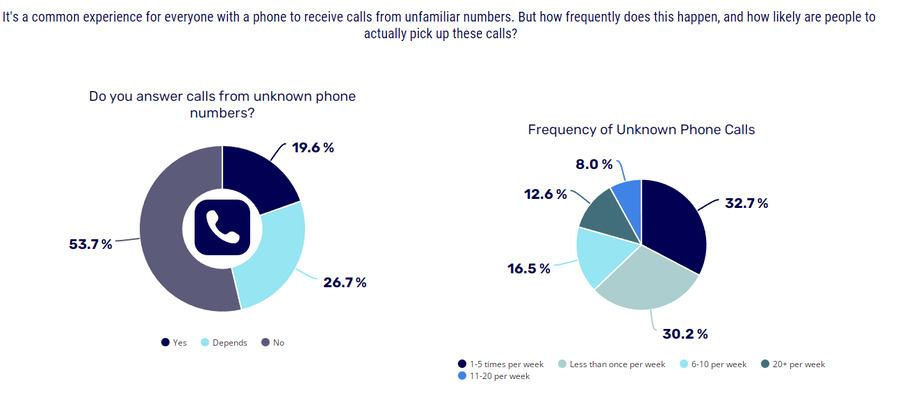
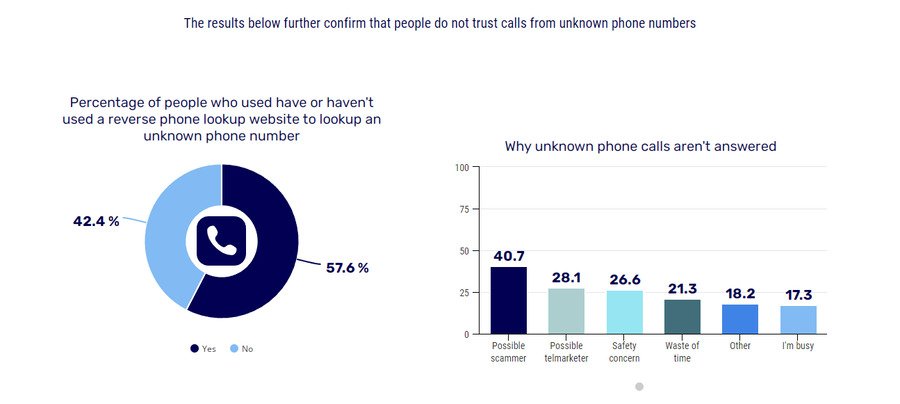
Let’s look at these results closer:
When receiving an unknown call, a majority (54% of respondents) said they did not answer the calls. Additionally, 27% of the respondents stated that it depends, and 20% responded that they do answer the call.
Source: A National Cellular Directory survey of 1,000 U.S adults.
When asked, "Have you ever tried to look up the phone number using a reverse phone lookup website?" 58% of respondents answered "Yes," while 42% answered "No."
Source: A National Cellular Directory survey of 1,000 U.S adults.
When asked, "Why don't you answer unknown phone numbers?" respondents could select more than one answer. The most popular answer selected was "
Possible scammer" with
41% of respondents choosing that option.
Other results:
- A possible telemarketer was selected by 28% of respondents.
- Safety concerns were selected by 27% of respondents.
- Waste of time was selected by 21% of respondents.
- Another was selected by 18% of respondents.
- I'm busy was selected by 17% of respondents.
Source: A National Cellular Directory survey of 1,000 U.S adults.
Additionally, the survey found that 70% of the participants answered that they receive multiple calls weekly from unknown phone numbers.
Source: A National Cellular Directory survey of 1,000 U.S adults.
Further Understanding the Survey Results
New research from the National Cellular Directory has helped raise awareness of unknown phone calls.
Despite the risk, National Cellular Directory's research has found that almost half of all survey participants still answer calls from unknown phone numbers. The survey also found that most people receive multiple weekly phone calls from unknown phone callers.
Answering a phone call from an unknown phone number is always a risk. People should always be wary about picking up the phone if they know who is calling on the other end.
National Cellular Directory recommends performing a reverse phone lookup search to look up an unknown phone number instead of answering the phone call. Performing a reverse phone lookup can help those who want to know who is calling them find out without picking up the phone.
Why Caller ID Doesn’t Always Work
Caller ID makes it simple to recognize an incoming caller by glancing at your phone screen or an electronic voice that conveniently calls out the caller's name or phone number. With Caller ID, individuals receiving phone calls can easily choose if they wish to answer the call, resulting in phone users not knowing the incoming phone number less and less.
But sometimes, a call comes in with a number you need to recognize. This can happen for different reasons, adding a bit of mystery to your phone experience. When there are times when a call comes in that has an unrecognizable number, what is the reason? Unknown calls can have multiple motives, but most aren't noble.
Where did the problem of receiving unknown calls begin?
Consumers constantly hand out their phone numbers to unreliable sources. Often, they need to realize it.
Our personal phone numbers pass through many hands daily, whether via online shopping websites, office information forms, or store salespeople. It's no wonder we all receive calls from telemarketers or individuals we do not know frequently.
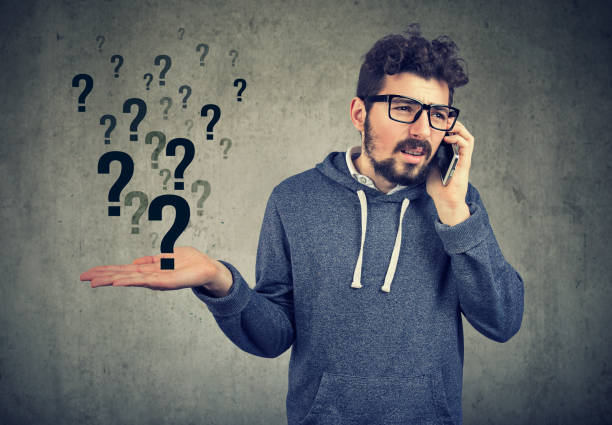
Why Am I Receiving Unknown Phone Calls?
Most of the time, if your phone rings and you don't recognize the incoming number, it's likely a telemarketer looking to sell you something or a scammer attempting to steal your personal information or con you into giving up personal banking numbers.
According to Future Market Insights, in 2023, the estimated worth of the robocall mitigation market is around $5.4 billion, with a projected increase to approximately $18.05 billion by 2033.
Anticipated sales growth for robocall mitigation during the forecast period is a noteworthy Compound Annual Growth Rate (CAGR) of 12.7%.
Tip: In 2022, the Federal Trade Commission (FTC) received over an excessive 1.8 million complaints regarding robocalls.
When these unknown numbers come in, phone users wonder, "how did you acquire my personal number?".
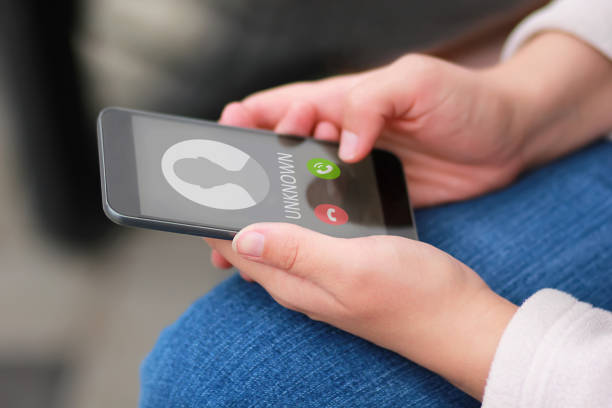
How Do Callers Get My Phone Number?
Unknown callers can obtain phone numbers through various means, some legitimate and some potentially intrusive or malicious.
Most phone users find unknown phone calls the most frustrating is from telemarketers. More often than not, they are trying to give information or sell a product that consumers are not interested in, resulting in a frustrated individual who would rather have spent their time on the phone doing almost anything else.
So how do these telemarketers get our phone numbers? There are several simple ways. We must most commonly be aware of how often we overshare our phone numbers.
Here are the most popular ways that our phone numbers get put into the wrong people's hands:
- Sign-up sheets
- Information forms
- Online shopping
- Online billing sites
- Social media networking
- Public Records
In general, the high rise in the use of technology puts both landline and mobile phone users at great risk of solicitors getting ahold of our personal information. To be more specific, when using the internet from our mobile devices, we often click the small box to accept the Terms of Use without reading the conditions.
Unfortunately, when we do this, we willingly give our information to be harvested and sold to anyone interested. This information can include cell phone numbers.
History Lesson: Where did telemarketing even begin?
The start of selling goods and services through telephone calls was a brilliant idea discovered by homemakers who wanted to sell their baked goods, so they began making phone calls from their homes to potential buyers. By the mid-'60s, professional businesses had picked up on this marketing technique, and it has since become the most cost-effective way to make sales in today's business world.
Because of the popularity and success of telemarketing, almost all phone numbers, home and cellular, will continue to receive unwanted phone calls from unknown numbers for the time being.
However, it's only sometimes telemarketers looking to sell their products when your phone rings and displays an unknown incoming number on the screen. Often, these unknown numbers are medical offices, old friends you may no longer have contact information for, an ex-significant other, or work-related phone calls. These unknown callers could also be accidental callers who innocently dial incorrectly or search for the person who had your phone number before it became your own.
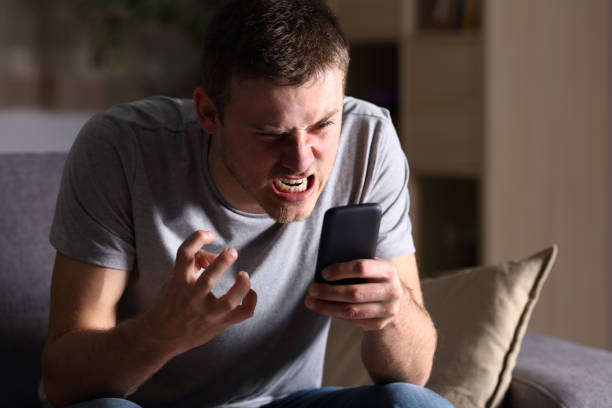
Other Types of Unknown Phone Calls
Here are a few more common unknown phone call scenarios that aren't telemarketers:
Spam Calls: These are unwanted calls from individuals or organizations trying to sell products, services, or scams. Spam callers may use automated dialing systems or pre-recorded messages to reach many people quickly.
Robocalls: Robocalls are automated calls made using computerized systems. They can be legitimate, such as automated appointment reminders from doctors' offices or spam calls promoting various offers or scams.
Scam Calls: Scammers often use unknown phone numbers to deceive individuals into providing personal information, money, or sensitive data. Common scam tactics include posing as government agencies, banks, or businesses to extract information or money from unsuspecting victims.
Wrong Number Calls: Sometimes, unknown calls result from dialing a wrong number. In these cases, the caller may have mistakenly dialed your number.
How Do I Know Who Called ?
Fake and unknown calls are frustrating and annoying to receive, and they can quickly cause permanent damage to relationships.
By using this free reverse cell phone lookup guide, it is simple to determine who it might be that keeps making your phone ring.
By typing in the phone number, you can quickly receive a plethora of information about your unknown callers, like the owner's name, address, and the phone type and carrier they've dialed you from. Unlike searching through Google or social media, which has a low accuracy rate, the National Cellular Directory's free service is correct more than 80% of the time.
With this service, you won't find yourself repeatedly wondering and asking, "Whose phone number is calling me?".
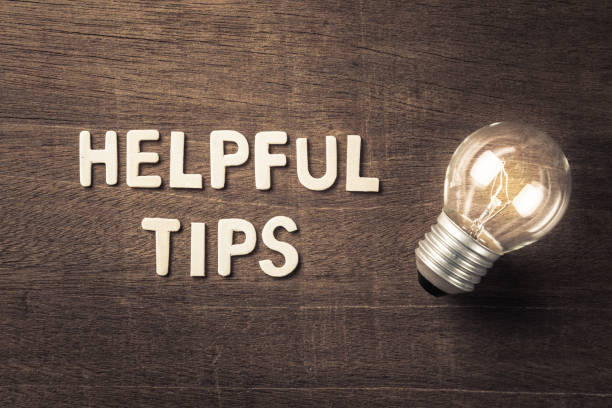
I Know Who Called, Now What Should I Do?
Once you've determined your caller, you can easily stop them from becoming repeat offenders by following simple steps.
Adding your landline or mobile phone number to the National Do Not Call Registry can significantly reduce, if not eliminate, phone calls from telemarketers.
This site allows users to report unwanted calls, register numerous phone numbers, and file a report should unwanted telemarketing calls continue to be received after their phone numbers are registered.
Today, mobile devices make blocking unwanted callers from your phone even simpler. And you won't have to keep asking, "Who's this calling me?" once you've taken advantage of call blocking and other features.
iPhone users can follow these simple steps to block unknown callers with just a click of a few buttons, while Android users can do the same here.
You can also download various phone applications to help with this problem or pay your phone carrier an extra monthly fee to protect you from unsolicited or fake calls.
Each carrier will vary, so contact yours for further information on using this service.
Why Should I Not Answer An Unknown Number?
For starters, answering an unknown call could be very dangerous.
An unknown caller is frequently a scammer looking to record your voice, learn personal information by asking just the right questions quickly, or gain remote access to our phones simply by answering the phone call.
Sometimes, users who do not recognize an incoming caller will answer their phone when an unknown number appears across the screen.
However, just because the call was answered, there may not be anyone on the other end. If you choose to answer an unknown phone number but hear radio silence once you've picked up, you might find yourself fishing to find out who called you because, as far as you can tell, no one is there.
Experts believe these types of silent phone calls are part of a large fraud scheme that ultimately leads to your identity being stolen and your bank accounts completely drained. While you may think there is no one on the other end of the line, a computer silently gathers an abundance of information about you right through your phone, simply from you answering and saying "hello."
Safety Tip: The Federal Communications Commission (FCC) strongly urges phone users to let unknown numbers go unanswered. They provide a handful of tips on dealing with numbers you may need to recognize.
In addition to registering your numbers on the Do Not Call registry and utilizing the robocall blocking service provided through your phone carrier, the FCC encourages those who believe scammers are contacting them to file a report. The FCC recommends filing a report to the local police, the Federal Trade Commission's Complaint Assistant, or the FCC's Consumer Help Center.
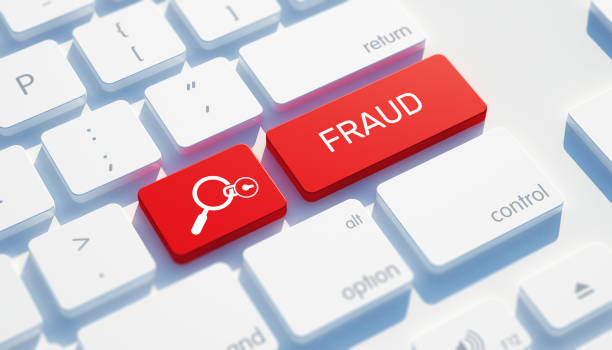
How can you prevent this?
Don't answer unknown numbers that are making your phone ring.
It is estimated that one in every 2,200 calls is a fraud attempt, so to avoid being a part of that statistic, screen phone calls from numbers you do not know and report them to the places mentioned above.
Even if the unknown phone number may have an area code that you might recognize, it is the safest choice to send it to voicemail.
Tell yourself, "If the person who's calling me needs me badly enough, they'll find another way to contact me.", and save yourself the headache of being caught in a scam.
In a popular effort known as "neighborhood spoofing," scammers use numbers with local area codes to increase their chances of having you answer their phone call.
Consider solutions like white pages reverse phone lookup to verify all unknown calls.
Even if you recognize the area code, send it to voicemail. If you need clarification on who is calling, send it to voicemail.
It is better to be safe than to be sorry!
Study Summary
Dealing with unknown phone calls can be a frustrating and sometimes concerning experience. In today's digital age, where personal information is easily accessible, and scams are prevalent, it's important to be cautious when answering unfamiliar numbers.
The results of the survey conducted by the National Cellular Directory shed light on the prevalence of unknown phone calls and the various reasons people hesitate to answer them. The rise of robocalls, spam, and scams highlights the need for effective strategies to manage these calls and protect yourself from potential threats.
One of the most valuable tools at your disposal is a reverse phone lookup service, like the one provided by National Cellular Directory. Using this service, you can quickly uncover the identity of unknown callers, reducing the need to answer calls from suspicious numbers. Additionally, registering your phone numbers on the National Do Not Call Registry and utilizing call-blocking features can help minimize unwanted calls.
Remember, the safety of your personal information and your financial well-being is paramount. When in doubt, it's safer to let unknown calls go to voicemails and the caller's identity through an online phone directory such as National Cellular Directory.
Full Survey Results: